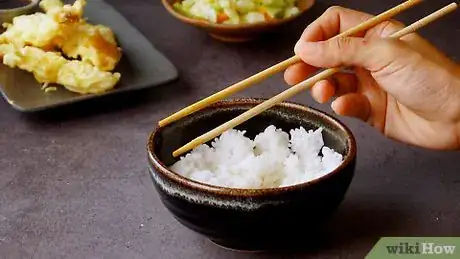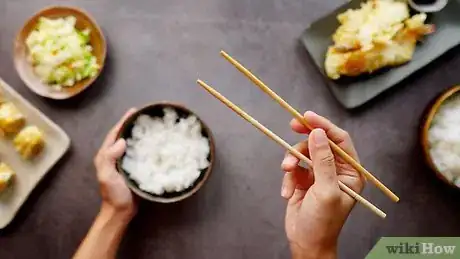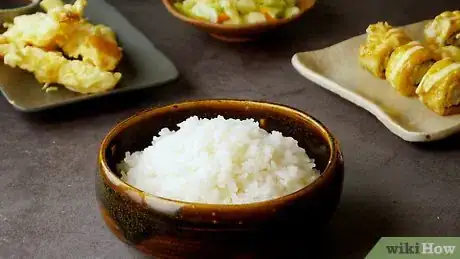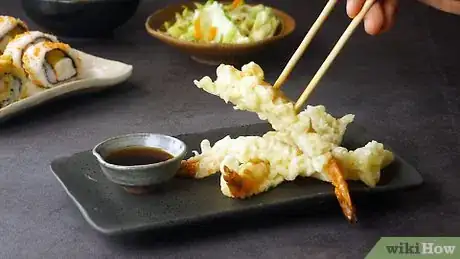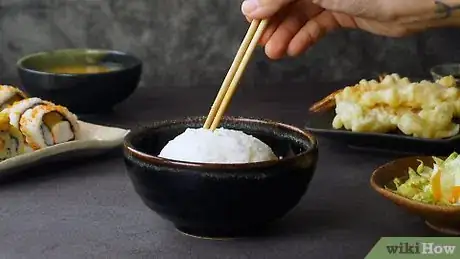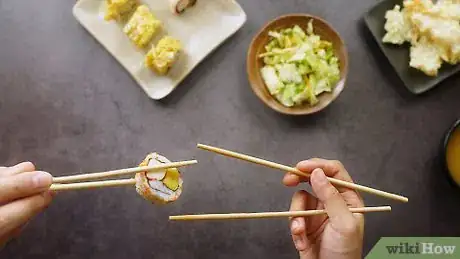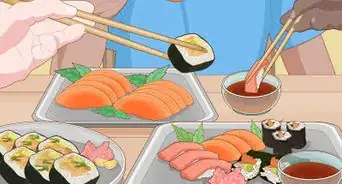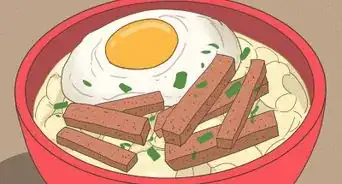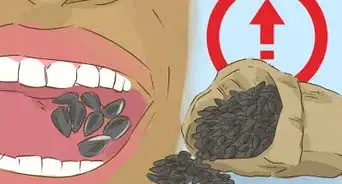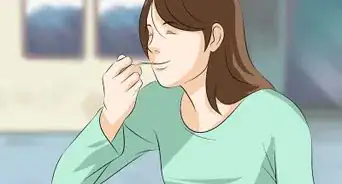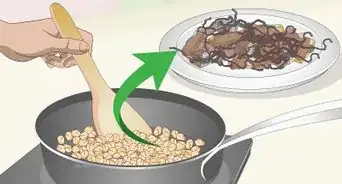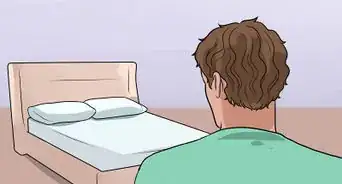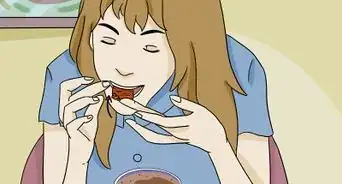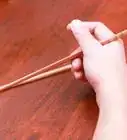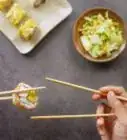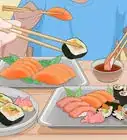This article was co-authored by Yoko Isassi. Yoko Isassi is a Japanese Food Specialist and the Founder of Foodstory in Los Angeles, California. Since 2011, she has taught others how to cook Japanese food and educated others about Japanese food culture. Yoko holds an MA from Columbia University.
wikiHow marks an article as reader-approved once it receives enough positive feedback. In this case, 100% of readers who voted found the article helpful, earning it our reader-approved status.
This article has been viewed 170,478 times.
So you've mastered eating meats, vegetables, and sushi with chopsticks, but still find yourself thwarted by the simplest food of all: rice. Worry no longer. By brushing up on the fundamentals of good chopstick form and learning a few rice-specific tips, almost anyone can become an expert with a pair of kuaizi.
Steps
Learning Chopstick Techniques
-
1Hold both chopsticks with the side of your thumb. Eating rice with a set of chopsticks is easiest if you're using your chopsticks the way they were intended to be used. Luckily, this is easy to learn! Start by lining up your two chopsticks and holding them in your dominant hand. Slide them into the "crook" between your thumb and the side of your hand. The "squishy" part at the base of your thumb should pin them in place.[1]
- You'll want the two chopsticks to be lined up on top of each other, not side-to-side.
-
2Grasp the top chopstick like a pencil. With the two chopsticks resting in the crook of your thumb, slide the top one up so that you're holding it with your thumb, index, and middle fingers. The pad of your thumb should hold the stick from the side. Your index finger should bend around it and rest on top. Your middle finger should support the stick from the other side. This may sound complicated, but it should be fairly similar to how you'd hold a pen or pencil!
- If you're having trouble, set the other chopstick down so you can concentrate on this one. It's easy to slide back in later.
Advertisement -
3Keep the bottom chopstick steady. One of the most important things to remember when eating with chopsticks is that the bottom chopstick doesn't move. Keep holding it in place with the fleshy part at the base of your thumb. Light pressure should be find. You don't need to keep a death grip on it. Bend your ring finger so that it supports the bottom of the stick with the side of your last knuckle.[2]
-
4Use your thumb, index, and middle finger to move the top chopstick. Maintaining the rest of your form, practice bending and extending your middle and index fingers. When you extend them, the top chopstick should point up. When you bend them, it should point down and eventually touch the other one.[3] Practice this up-and-down motion until you're comfortable with it.
- Try to keep your thumb straight as you do this. If you bend it to move the top chopstick down, it's easier for your form to collapse and for you to lose control of the sticks.
- Remember, the bottom chopstick doesn't move. Keep it wedged in place and supported by your ring finger.
- Practice your moves by having both chopsticks' food ends touch each other repeatedly.
-
5Grab bits of food by pinching them between the chopsticks. Make a plate of food for practice purposes. If you'd rather not, you can also crumple up a few pieces of notebook paper and set them on a plate. Use a pinching motion of the chopsticks to pick up the food or paper balls between the ends of the sticks and bring them up to your mouth. It can take a little practice to get used to the feeling of holding food by squeezing it between two sticks, but it should quickly become less awkward.
- If you're using food and this is your first time, you may want to lay down a towel to protect against spills.
Using Chopsticks to Eat Rice
-
1Hold your chopsticks sideways. Rice can be particularly difficult to eat even if you master the chopstick technique above. In this section, you'll learn a few tricks for making this task easier. Start by taking the basic chopstick form and turning your hand 90 degrees to the side. Your chopsticks should now rest above your hand, rather than beside it. You should still be able to move the chopsticks together and apart easily.
- This makes it easier to support balls of rice as you lift them up to your face. It's hard for the rice to fall between two horizontal sticks. On the other hand, it's a lot easier for it to fall to either side when it's balanced between two vertical sticks.
-
2Lift the rice from below. Picking up rice with chopsticks isn't so much a "pinching" motion as it is a combined "scooping/pinching" motion. To pick up some rice, hold your chopsticks open so that one is on either side of a good-sized clump. Bring the chopsticks together near the bottom of the clump and gently squeeze as you lift it upwards.
- Lifting the rice from the bottom makes it easier to handle without dropping any. The more tightly-packed rice between the chopsticks supports the rice above it, turning your set of chopsticks into a sort of makeshift spoon.
-
3Lift the bowl up to your mouth. This is usually a big piece of the puzzle for people who are struggling with eating rice. Use the hand that isn't holding chopsticks to pick up the rice bowl and bring it a few inches from your mouth. Now, transfer rice from the bowl into your mouth with the pinching and scooping method above. Use the bowl to catch any mistakes. This doesn't just make the task much easier. It's also considered more polite in many countries that use chopsticks.[4]
- Note, however, that it's considered a little impolite to shovel food directly from the bowl into your mouth. Pick up pieces of rice and bring them into your mouth. Don't just put your lips to the bowl and move the rice toward your mouth.
-
4If you can, choose sticky rice. Not all rices have the same weight and texture. For the easiest results, try picking a short-grained white rice, which tend to form "sticky" clumps that are easier to pick up. By contrast, brown rice and long-grained white rice tends to stick to itself less, so it's much easier to drop or spill.[5]
Chopstick Etiquette
-
1Don't use your chopsticks like spears to skewer your food. Once you get the hang of using chopsticks, it's a wise idea to learn just a few simple "rules" for them. These aren't absolutely essential, but they're simple to learn and they don't make eating any more difficult. For example, chopsticks are not to be used to poke or spear pieces of food. This is considered crude. It's a little like going to a fancy restaurant and spearing food on your knife instead of using your fork.[6]
-
2Don't stick your chopsticks into your food so that they point up. This resembles the incense used at Buddhist funerals, so it is considered taboo.[7]
-
3Don't pass another person food "chopstick to chopstick." In other words, don't pick up a piece of food and hold it for another person to grab with their own chopsticks. Instead, put the food on his or her plate. This, too, has a negative connection to funeral rituals.
- In addition, when someone wants to give you food, offer your plate, rather than grabbing it with your own chopsticks.
-
4Don't take food from a communal plate with your chopsticks. This is considered unsanitary, especially if the chopsticks have already touched your mouth. Instead, use the utensils provided. There will almost always be a serving spoon or similar tool handy to transfer food to your plate.
References
- ↑ http://en.rocketnews24.com/2015/03/12/are-you-holding-your-chopsticks-correctly-chopstick-man-will-show-you-how-%E3%80%90video%E3%80%91/
- ↑ http://en.rocketnews24.com/2015/03/12/are-you-holding-your-chopsticks-correctly-chopstick-man-will-show-you-how-%E3%80%90video%E3%80%91/
- ↑ http://web-japan.org/kidsweb/cook/intro/intro02.html
- ↑ http://www.bitrebels.com/lifestyle/how-to-eat-rice-with-chopsticks/
- ↑ http://www.bitrebels.com/lifestyle/how-to-eat-rice-with-chopsticks/
- ↑ http://en.rocketnews24.com/2015/03/12/are-you-holding-your-chopsticks-correctly-chopstick-man-will-show-you-how-%E3%80%90video%E3%80%91/
- ↑ http://justhungry.com/your-guide-better-chopstick-etiquette-mostly-japanese
About This Article
If you want to eat rice with chopsticks, hold your chopsticks as you normally would but turn your hand so the chopsticks are horizontal. To pick up some rice, hold your chopsticks slightly open near the bottom of a clump of rice, then gently close the sticks around the clump of rice as you scoop it up. Use your free hand to pick up the rice bowl and bring it a few inches from your mouth, then lift the chopsticks to your mouth. For tips on holding your chopsticks properly, keep reading!
